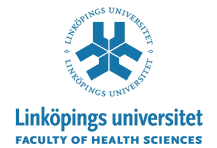|
|
| |
| COURSE TITLE |
| Health Inequalities, 7,5 credits,
7,5 points |
| |
COURSE CATEGORY Single subject course
MAIN FIELD OF STUDY Public Health Sciences - FH1
SUBJECT AREA Public Health Sciences - FHA
|
|
COURSE CODE |
|
8FA193 |
|
| AIM OF THE COURSE |
INTRODUCTION
The course is an independent course within public health sciences and can be included in a degree of master of sciences.
INTENDED LEARNING OUTCOMES
After completion of the course, the student is expected to know:
Knowledge and understanding;
Be able to describe the level and distribution of health in different populations and to describe social determinants of health.
Be able to analyze mechanisms for health development including social and economic conditions, gender, ethnicity, disability and use of care.
Competence and skills
Be able to apply theoretical concepts and models when explaining health inequalities
Judgement and approach
Reflect on health policies
|
| CONTENTS |
Explanation models for health inequalities
Central concepts within health inequalities
Sustainable development and welfare
|
| TEACHING |
| Student centered and problem based learning form the foundation for the teaching at the Faculty of Health Sciences (FHS). The student takes responsibility for, studies and researches current content of the courses and study programme. The working methods challenge the students to independently formulate questions for learning, to seek knowledge and in dialogue with others judge and evaluate achieved knowledge. Students work together in groups based on reality based situations to develop their own learning, contribute to the fellow students’ learning and to practice cooperation. The teacher’s role is to support the students in this way of learning. The curricula are thematically organised, integrating subjects in theoretical and practical modules throughout the study programmes. The study programmes collaborate in certain integration modules where interprofessional learning takes place through the participation of students from several professions learning with, about and from each other. The course methods and integration modules stimulate and support the student’s development of professional and interprofessional competencies as well as prepare the student for cooperation in the coming profession. |
| EXAMINATION |
The form of examination used in the course is an individually written exam. Compulsory parts with required attendance are seminars, which are required for the examination.
Extent of retake examination
Point of time for retake examination must be specified in the beginning of each semester. The extent of the retake examination must be the same as the regular examination. Remaining forms of examination, such as written exams, can be taken an unlimited number of times, by students who have not obtained a passing grade.
Exchange of examiner
A student who has obtained a failing grade twice for a course or a part of a course is, after request, entitled to be appointed another examiner, unless there are special reasons to the contrary.
Apply for examination/written exam
State how to apply for the examination before each course.
|
| ADMISSION REQUIREMENTS |
At least three years of full-time undergraduate studies, i.e. at least 180 credits, in a major subject area with relevance for the respective core disciplines/roles; for example Behavioural Science, Biomedical Laboratory Science, Dentistry, Dietetics, Medicine, Nursing, Occupational Therapy, Physiotherapy, Psychology, Public Health Science, Social Sciences, Speech Therapy, including an independent exam element which has at least 15 credits, or the corresponding equivalent. Applicants with a degree from a non-Swedish university must enclose an official examination certificate of at least three years of full-time studies in relevant subjects. The lowest acceptable grade from undergraduate studies is Pass.
Applicants must also have documented knowledge of English equivalent to Engelska B/Engelska 6; i.e. an internationally recognized test, e.g. TOEFL (minimum scores: Paper based 575 + TWE-score 4.5, and internet-based: Score of 20 (scale 0-30) in written test, total score of 90), IELTS, academic (minimum score: Overall mark of 6.5 and no section below 5.5), or equivalent |
| GRADING |
| The course is graded on the following scale: Pass; Fail. |
| CERTIFICATE |
| Course certificates are appointed by the Faculty Board of the Faculty of Health Sciences, after request by the student. |
| COURSE LITERATURE |
| The course literature is decided upon by the department
in question. |
| OTHER INFORMATION |
Planning and implementation of the course is to be based on the wordings in the course syllabus. A course evaluation is mandatory for each course and should include the question whether the course is in agreement with the course syllabus. The course coordinating teacher will analyse the course evaluation and propose appropriate development of the course. The analysis and proposal feedback will be given to the students, the Programme Coordinator/Director of Studies and as needed to the Board for First and Second Cycle Programmes, if it is related to general development and improvement.
The course is carried out in such a way that disabilities, ethnicity, gender and age are given prominence as relevant variables for analysis and discussion.
If the course is cancelled or undergoes major changes, examination is normally offered under this course syllabus, at a total of three occasions within a year, of which one in close proximity to the first examination.
|
| |
Health Inequalities, 7,5 credits
Ojämlikhet i hälsa |
| |
Department responsible
for
the course or
equivalent:
|
| |
|
|
|
|
|
| Registrar No: LiU-2014-00349 |
|
Course Code: 8FA193 |
|
|
|
| |
|
Exam codes: see Local Computer System |
|
|
|
| Subject/Subject Area : Public Health Sciences - FH1 |
|
|
|
|
|
| |
|
|
|
|
|
| Level |
|
Education level |
|
|
Subject Area Code |
|
Field of Education |
|
|
|
|
|
|
FH1 |
|
Vård |
|
|
2014-02-17
|
|
|
| |
